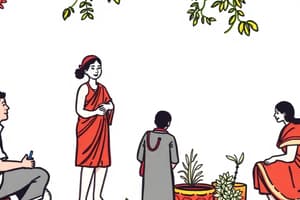Podcast
Questions and Answers
Which element of culture encompasses the ideas and practices that society holds to be true or important?
Which element of culture encompasses the ideas and practices that society holds to be true or important?
- Symbols and languages
- Custom
- Norms
- Values and beliefs (correct)
What aspect of society refers to the organized groups of people who share common language and territory?
What aspect of society refers to the organized groups of people who share common language and territory?
- Politics
- Culture
- Social Differences
- Society (correct)
What is NOT a cause of social differences among individuals?
What is NOT a cause of social differences among individuals?
- Beliefs (correct)
- Gender
- Age
- Education
Which of the following defines the state of adhering to social norms and expectations?
Which of the following defines the state of adhering to social norms and expectations?
Which of the following terms refers to standards of behavior that dictate what is considered appropriate or acceptable in a society?
Which of the following terms refers to standards of behavior that dictate what is considered appropriate or acceptable in a society?
Flashcards are hidden until you start studying
Study Notes
Elements of Culture
- Symbols and languages are fundamental components, facilitating communication and meaning within a culture.
- Values and beliefs serve as foundational principles guiding behavior and interpretations in society.
- Norms dictate acceptable behaviors, shaping ethics and social interaction.
- Religions often influence cultural practices and moral values, creating community identities.
- Customs are established practices that reflect a culture's traditions and historical significance.
- Laws and politics establish formal rules and governance, providing structure within society.
Cultural Variation
- Geographical barriers can lead to diverse cultures and traditions due to isolation or limited interaction.
- Different cultures manifest unique practices, beliefs, and lifestyles shaped by their environments.
Definition of Culture
- Culture encompasses the entirety of an individual's way of life, including food, clothing, and living spaces.
Definition of Society
- Society is an organized group of interdependent individuals sharing common territory, language, and culture, collaborating for collective survival and well-being.
Definition of Politics
- Politics involves the theory, art, and practice of governance, focused on power acquisition and decision-making.
- Political institutions are stable frameworks of roles, norms, and behaviors related to governance.
Social Differences
- Social differences arise from various social characteristics and qualities that distinguish individuals.
Causes of Social Differences
- Class influences access to resources and opportunities.
- Gender impacts roles, expectations, and social status.
- Education shapes knowledge and civic engagement.
- Race contributes to identity and experiences within society.
- Age affects perspectives, roles, and social dynamics.
Norms
- Norms reflect societal standards of propriety and morality, guiding behavior and ethics.
- Norms of decency dictate clothing appropriateness and behaviors reflecting civility and politeness.
- Norms of conventionality pertain to culturally specific beliefs and practices that may conflict with others, emphasizing respect for differing religious beliefs, particularly dietary restrictions.
- Conformity involves internalizing norms as social expectations, promoting harmony within society.
Studying That Suits You
Use AI to generate personalized quizzes and flashcards to suit your learning preferences.




